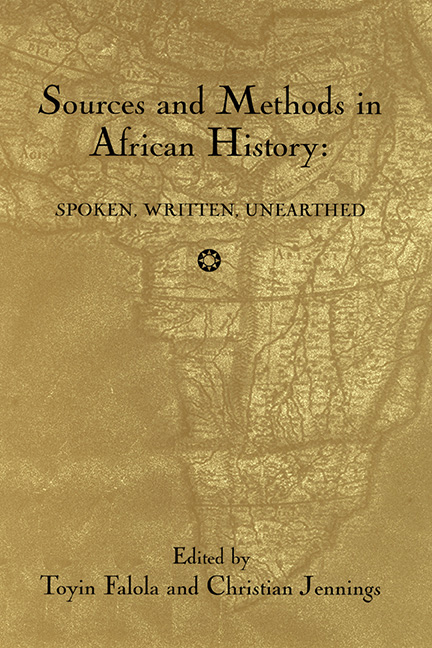Book contents
- Frontmatter
- Dedication
- Contents
- Acknowledgments
- Introduction
- Part I Archaeological Sources
- Part II Africa and the Atlantic World
- Part III Documentary Sources
- Part IV Oral Tradition
- Part V Innovative Sources and Methods
- 19 Section Introduction: Innovative Sources and Methods
- 20 Ben and Maggie: Consuming Data: Reassessing Scientific and Anthropological Evidence: Historical Perspective on Nutrition Studies
- 21 Electricity Networks in Africa: A Comparative Study, or How to Write Social History from Economic Sources
- 22 “Rain or Shine We Gonna' Rock”: Dance Subcultures and Identity Construction in Accra, Ghana
- 23 Sample Surveys: Underexploited Sources for African Social History
- Contributors
- Index
19 - Section Introduction: Innovative Sources and Methods
from Part V - Innovative Sources and Methods
Published online by Cambridge University Press: 25 October 2017
- Frontmatter
- Dedication
- Contents
- Acknowledgments
- Introduction
- Part I Archaeological Sources
- Part II Africa and the Atlantic World
- Part III Documentary Sources
- Part IV Oral Tradition
- Part V Innovative Sources and Methods
- 19 Section Introduction: Innovative Sources and Methods
- 20 Ben and Maggie: Consuming Data: Reassessing Scientific and Anthropological Evidence: Historical Perspective on Nutrition Studies
- 21 Electricity Networks in Africa: A Comparative Study, or How to Write Social History from Economic Sources
- 22 “Rain or Shine We Gonna' Rock”: Dance Subcultures and Identity Construction in Accra, Ghana
- 23 Sample Surveys: Underexploited Sources for African Social History
- Contributors
- Index
Summary
As a latecomer to the historiographical enterprise, African history has been in a position less to reinvent the wheel than to take advantage of sets of wheels already in place. True, at first the new enterprise tended to concentrate on using existing written sources and newly mined oral ones, and the results of archeology. Still, the promise of more was always there, as exhibited in an early work, Daniel McCall's Africa in Time Perspective (New York: Oxford University Press, 1969), which had separate chapters devoted to a number of other approaches which were then in their infancy, even outside African studies. In the ebb and flow of the past forty years, various sources and various approaches have come and, in some cases, gone as well. The papers in this section each treat sources that might not in the normal course of things be regarded as historical sources, except by those willing to regard all evidence from the past as evidence for the past as well. Given the paucity of source materials, Africanists can hardly afford to think otherwise.
In her paper, Cynthia Brantley treats colonial reports on nutrition as such an opportunity. To do so she must first argue against those who would reflexively treat such evidence as “tainted by the ignorance, arrogance, and racism of their producers.” To what degree this point of view is common is hard to say. Certainly examples are not hard to find, but Brantley rightly points out that there is no pressing reason to regard this evidence any differently than, say, oral data, which has certainly done very well in accruing credibility. Brantley's source of choice is the 1939 Nyasaland Nutrition Study, the very title of which is enough to put off the unsuspecting. For various reasons these data remained unpublished, so Brantley's paper represents a case of bringing new data into the public domain. Better yet, there appear to have been both an official and a minority report, allowing the modern scholar to study two differing, yet equally primary, perspectives. Needless to say, this is hardly very often the case, at least for these kinds of material, which usually appear in anodyne and impenetrable officialese. (Some might disagree with Brantley, though, in her contention that there is a “presumption that all colonial data [are] in colonial archives and that projects undertaken exist at least in some sort of report.” If only!)
- Type
- Chapter
- Information
- Sources and Methods in African HistorySpoken Written Unearthed, pp. 331 - 334Publisher: Boydell & BrewerPrint publication year: 2003

